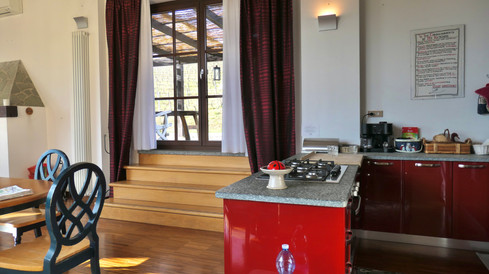Dacapo winery, Piemonte
- Mike
- Feb 19, 2023
- 7 min read
Updated: Apr 23, 2024

When you’re visiting small wineries in Italy that occupy lovely old properties in beautiful settings you often find yourself wishing that the owners would provide some sort of accommodation for rent so you can linger in the atmosphere of these places. Even more so when the wine is so good that you’d much prefer to simply cook yourself dinner afterwards and enjoy a bottle surrounded by the same vines that gave birth to the liquid in your glass.
Eventually in our travels we were bound to stumble upon someone who recognizes the attraction of this concept to wine country tourists and at Dacapo winery we found that person in Renata Bonacina.

Renata is not your typical Italian vineyard owner and winemaker. She and her husband Giovanni are a cosmopolitan and well-traveled couple at ease in different cultures and different languages who on their return to Italy in the mid 1990s fell in love with the Langhe and found their ideal property to renovate in Castiglione Tinella, approximately half way between Asti and Alba.
Several years of hard work later the restored and replanted vineyards re-opened as the Cà ed Balos winery and as their land already had a long history with the Moscato grape they kept faith with tradition. Moscato d’Asti became Renata’s first love and her affection for the Moscato Bianco grape continues even today almost two decades later when it is just one of the many grape varieties in her impressive portfolio of wines.

There is a restless energy about Renata and I’m guessing that producing Moscato d’Asti year after year virtually on autopilot proved not to be sufficiently challenging for her talent or ambition so in 2017 they acquired the Dacapo winery which expanded their geographical footprint north to Agliano Terme (Barbera vineyards) and into Monferrato (Ruchè and Nebbiolo vineyards) and her range of wines to 12 different labels.

Enough of a challenge for anyone but Renata doesn’t come across as a person who has bitten off more than she can chew.
The purchase of Dacapo with its well situated Barbera and Ruchè vineyards was a particularly astute move because Ian D’Agata in his 2014 comprehensive and scholarly reference book ‘Native Wine Grapes of Italy’ devotes four pages to the Barbera grape and makes special mention of Dacapo’s Barbera wines; high praise indeed when you consider the plethora of much more famous producers of Barbera that are to be found in Piemonte.
Also, in the section devoted to Ruchè, two of his four best examples of this wine were Dacapo and Crivelli. He elaborated further on Dacapo's Ruchè wine, called Majoli, as follows: 'in good years so pure and fragrant it can be one of Italy's thirty or so greatest wines'. A remarkable endorsement given how many great wines Italy produces and given also the very reasonable 11 euro price of Majoli.
A year ago we wrote an article entitled ‘Eating and Sleeping in Valpolicella’ that described an ideal place to stay in the middle of the vineyards with a lovely walk to an excellent nearby restaurant. After our stay at Dacapo winery we are similarly enthusiastic about the apartment that Renata has refurbished for rental. She has clearly drawn on her previous career and her wide experience of living and traveling in other countries to design and furnish the perfect space for a family or small group of wine country tourists.
The photos we took (above and below) and those on the Dacapo website will perhaps do a better job of conveying the level of comfort and spaciousness than mere words, but suffice to say that as frequent renters of all types of accommodation across the length and breadth of Italy, Renata has done a fine job with this apartment.
But photographs never tell the whole story because we have got used to seeing pictures of great looking kitchens on short term rental properties only to find on arrival that they are so poorly equipped as to make it almost impossible to cook a decent meal, due either to the owner’s neglect or more likely their preference for you to not actually use the kitchen but to eat out instead.
However, if you arrive after a long journey with good food to cook and discover that there’s not even any salt or olive oil provided it is irritating beyond belief. Do these owners really expect you to bring these items with you or to immediately trudge to the nearest shop and buy a kilo of salt or whole bottle of olive when you only need a small amount?
It is attention to details like these that make seasoned travelers like us happy and Renata’s kitchen was one of the very few that we’ve come across that was properly stocked to enable her guests to relax and not worry about the small but necessary items we all take for granted.
As for the rest of the apartment, the bedrooms, bathroom, living room and terrace were all much more spacious and better appointed than our own apartment in Lucca so Renata gets top marks for everything.

It would of course be a little awkward to stay in a gorgeous apartment above a winery and then discover that the wines are only mediocre. Happily the opposite is true here and if it weren’t then this article wouldn’t have been written because, as for every other article on this website, we receive no compensation or payment of any kind for writing this. We paid for our wine as well as the apartment on the same basis as any other tourist.
In 2018 Renata improved and enlarged the Dacapo winery, added temperature control equipment and also restored the ancient barrel cellar below the winery building. She has long been a proponent of organic farming and has a passion for the indigenous grape varieties of Piemonte, all grown in the very heart of their traditional zones where they best express the terroir.
Renata's responses to our two fun questions about the other wines she enjoys and her favorite dish were as follows:
Wine: Malvasia Istriana and other wines from Istria
Dish: Risotto allo Zafferano

Tasting Notes:
Rarely do we come across a winery where every single wine is of such high quality. Furthermore all of Renata's wines display great typicity and all are exceptionally well-balanced. What they all have in common is elegance.
Cà ed Balos - L'Attesa 2021 - Piemonte Rosato DOC (14% alcohol)
(60% Nebbiolo, 40% Merlot, fermented and aged in stainless steel)
An interesting grape combination that really works. A touch of sour cherries on the nose, this is a very balanced wine with notes of pomegranate on the palate and a savory finish of bitter almonds that has you reaching for more. This is quite refined and very food-friendly, not one of those inconsequential aperitif rosè wines that are often found across the Italian peninsula. At 10 euros in Italy it's a bargain.
Cà ed Balos - Moscato d'Asti 2021 DOCG (5.5% alcohol)
(100% Moscato Bianco, fermentation stopped early in a stainless steel pressure tank to produce a sparkling wine with high residual sugar and low alcohol)
Renata's first love among grapes, this is a well-made easy to drink Moscato. It's pleasantly aromatic with notes of white flowers and stone fruits and has a certain finesse with the sweetness never cloying. Perfect to accompany a dessert.
Dacapo - Majoli 2021 - Ruchè di Castagnole Monferrato DOCG (15% alcohol)
(100% Ruchè, fermented and aged in stainless steel)
Deep ruby red with an intense and aromatic nose redolent of rose petals and violets with a touch of sweet spices. Everyone should try at least one Ruchè wine because just like marmite you'll either love it or hate it. I'm a big fan of this grape and this Majoli is a great advert for Ruchè. On the palate there's an abundance of dark fruit and some balsamic notes ending with a slight bitterness on the long savory finish, almost like a refreshing amaro. Super wine for the price and I expected nothing less after Ian D'Agata's comments. 11 euros

Dacapo - Giarè 2020 - Langhe Dolcetto DOC (13% alcohol)
(100% Dolcetto, fermented and aged in stainless steel)
There is an attractive cherry richness to this wine and the tannins are surprisingly soft for such a young Dolcetto that has seen no wood. Finishing with a hint of almonds this is a well-balanced wine for pleasurable drinking on release that offers wonderful value at 9 euros
Dacapo - Sanbastiàn 2020 - Barbera d'Asti DOCG (15% alcohol)
(100% Barbera, fermented in stainless steel and aged for 9 months in large French oak barrels which are old and not toasted)
Almost purple in color, this is immediately attractive on the nose with notes of blueberries, redcurrants and sweet spices. It's a remarkably well-balanced wine with acidity that is juicy and refreshing rather than harsh and intrusive. Good fruit on the palate with tannins very much in the background. The 9 months spent in barrel have made this into a smooth, easy drinking Barbera, however it does not lack typicity. A wine to be sought out by all those people who think Barbera is too acidic, especially given the excellent value proposition at 10 euros.

Dacapo - Valrionda 2019 - Barbera d'Asti Superiore DOCG (15% alcohol)
(100% Barbera, fermented in stainless steel and aged for 12 months in large French oak barrels)
This is a sensational Barbera that manages to combine the natural acidity of this grape with a rich red berry fruitiness that coats the palate in an exceptionally balanced way. Notes of licorice fade into a pleasantly peppery finish. Full-bodied for sure but this is amazingly light on its feet for a 15% alcohol wine and remains fresh and elegant throughout. Renata's skill and experience with the Barbera grape lies is in judging the perfect amount of wood exposure to match the individual characteristics of each vintage.

Ian D'Agata was spot on when he was so effusive in his praise for the raw material in the Dacapo vineyards and Renata has exploited it to the fullest. 13 euros is a very fair price to pay for such quality.
Dacapo - Vigna da Capo 2016 - Nizza Riserva DOCG
(100% Barbera single vineyard 'cru' wine, fermented in a french Allier vat then aged for 24 months in oak barrels the size of which depends on the characteristics of that particular vintage).
Tasted on site, this is a complex wine that still had plenty of mature cherry fruit but also those lovely tertiary aromatics and flavors that come with age, including tobacco, leather and sweet spices. Well worth storing this wine for a few years to enjoy it at its best.

Cà ed Balos - Grappa di Moscato - Amber version (42% alcohol)
(100% Moscato, aged for 6 months in French oak barriques)
I've tried dozens of different types of grappa in my 9 years in Italy and none of them have converted me from Scotch, but Renata's amber version just might. The nose here is a heady mix of hazelnuts, tobacco and orange and though there's no real sweetness on the palate there is a rich butterscotch flavor that comes through. Dry and very mellow with a finish that is long and smooth. A grappa to sip and savor after dinner.







